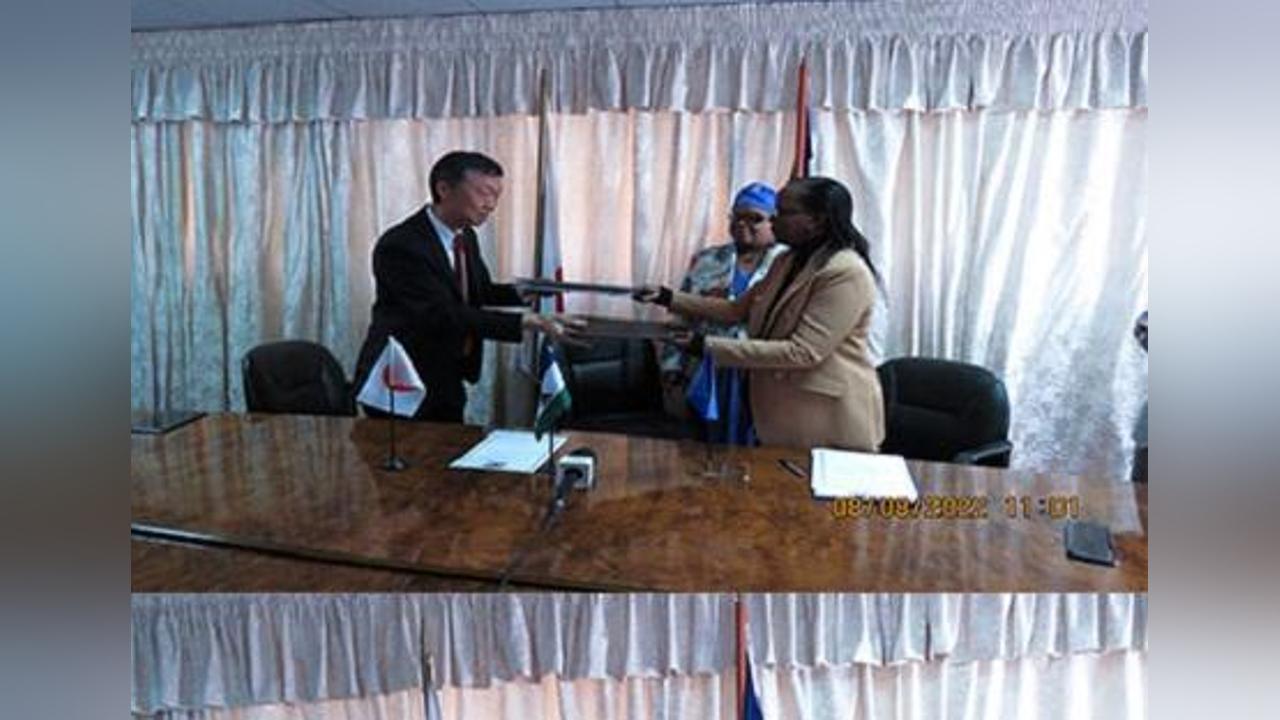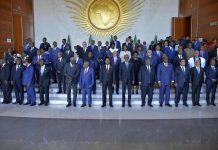Africa-Press – Lesotho. The Government of Japan and the World Food Programme (WFP) signed the Exchange of Notes on Food Assistance Programme for Lesotho at the event held at the Ministry of Foreign Affairs and International Relations premises in Maseru on Monday.
The Signing of this Agreement paves the way for the donation of USD2 million from the Government of Japan to the Government of Lesotho. Speaking at the event, the Ambassador of Japan to Lesotho, Mr.
Maruyama Norio said the provision of school meals has become critical in improving access to food as well as the nutritional status of school learners, given the nutrition challenges faced by children in the country.
Mr. Norio said undernutrition and stunting remain a persistent challenge mainly in rural areas, reaching a peak at 43 percent among children aged 24 -36 months who are enrolled in a pre-primary school.
He said the contribution will support 50,000 pre-primary school children at 2,000 Early Childhood Care and Development Centres (ECCDs) for 180 school days.
The contribution will be used to procure canned fish and fortified maize meals which will be served during lunchtime, supplementing the specialized nutritious mid-morning porridge prepared from super cereal also provided by WFP.
He further said this contribution will add to the standard daily lunch meal already provided to ECCDs through the assistance of the government of Japan. WFP Country Director and Representative, Ms.
Aurore Rusiga said the signing of the Exchange of Notes with the Ambassador of Japan to Lesotho is for a contribution through the Kennedy Round Food Assistance that will support the food security and nutrition of vulnerable populations in Lesotho. Ms.
Rusiga said support from Japan comes at a critical time of global food crisis when the world is breaking records in numbers of food insecure people due to climate shocks, high food and fuel prices, saying Lesotho is also hard hit as communicated recently by the Lesotho Vulnerability Assessment Committee findings in July 2022.
She said according to the Lesotho Vulnerability Assessment Committee, about 521 000 people are food insecure and need humanitarian support, adding that the food insecure population is likely to increase further due to decreased livelihood opportunities and increased food and non-food commodities prices.
Moreover, she mentioned the contribution from the Government of Japan will be used by WFP to bridge the food security gap and ensure the continuous and undisrupted provision of school meals especially by providing fortified maize meal and canned fish to 50,000 pre-primary school learners from 2,000 ECCDs nationwide.
She stressed that Japan has played a pivotal role in supporting the Government of Lesotho in food security and nutrition, noting that the Japanese support to school feeding programme which applies a home-grown approach, provides immediate food and nutrition sustenance to school children and promotes child development. In conclusion, Ms.
Rusiga mentioned that Japan is one of WFP’s largest government partners supporting WFP’s engagement with the national government to achieve the Sustainable Development Goals (SDGs), especially SDG 2, noting that from 2004, the WFP Lesotho has received contributions amounting to nearly USD 19.5 million from the Government of Japan that allowed WFP to deliver not only food and nutrition assistance to save lives but also for building the capacity of smallholder farmers to change lives and promote the home-grown school feeding model.
This assistance contributes to the Humanitarian Development Peace nexus and promotes Human Security, a sector of key importance to the Japanese Government. In her remarks, the Minister of Foreign Affairs and International Relations, Mrs.
Matšepo Molise-Ramakoae extended her gratitude to the Government of Japan for this generous gesture of goodwill, saying the generosity of the government of Japan and WFP is commendable, as it has evoked amazingly her emotions, knowing the significance it has on the bilateral cooperation between Lesotho and Japan. Mrs.
Molise-Ramakoae said the donation comes at the time when Lesotho has registered the lowest harvest of summer cropping due to torrential rainfall that besieged this country throughout the last summer season, adding that this noble gesture will beyond a reasonable doubt make a positive impact, particularly to those young and vulnerable children who might not have access to food due to the ever-increasing scourge of food insecurity in the country.
She further mentioned that this donation will indeed go a long way in the history of the bilateral relations between Lesotho and Japan, which is aimed at providing food and nutrition assistance to 60,000 pre-primary school children in Early Childhood Care Development schools across the country for 24 months.
On behalf of the Ministry of Education and Training, the Principal Secretary of Basic Education, Dr Dira Khama said the school feeding programme contributes to efforts to address challenges including malnutrition, undernutrition, stunting and low enrolment rates at pre-primary, and primary levels, saying over the years this invaluable contribution has made school feeding one of the largest safety-net programmes in Lesotho.
Dr Khama said studies have shown that a well-designed school feeding programme can be a panacea for some of the bottlenecks persisting in our education system.
He said the Ministry of Education and Training recognises school feeding as an investment and not an expenditure, saying there is evidence to suggest that improved nutrition leads to improved cognitive capacities of children.
He further mentioned that other benefits of the school feeding scheme include improved school attendance and access, noting that many children attend school because it is a place where they can access a decent meal.
Dr Khama said hunger and malnutrition have debilitating effects on the physical and mental health of children and negatively affect their behavioural and emotional development, saying children are at the core of the school feeding policy.
He assured that the Government of Lesotho through the Ministry of Education and Training will do everything possible to ensure that these food commodities reach those that are intended for, being the vulnerable children in ECCD centres.
In Conclusion, he thanked the WFP and the Government of Japan for their continued support of the school feeding programme in Lesotho. The Government of Japan has been funding food assistance for developing countries since 1968 and is a long-standing partner of WFP Lesotho. This new contribution brings Japan’s total contribution towards WFP’s humanitarian assistance in Lesotho to more than US$ 19.5 million.
For More News And Analysis About Lesotho Follow Africa-Press






